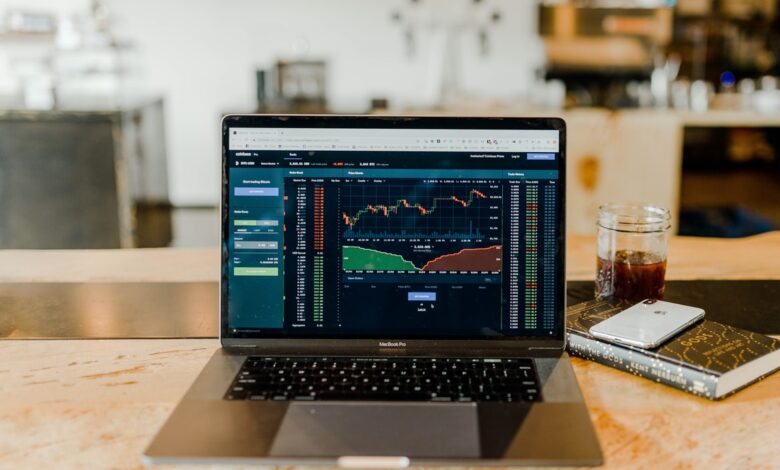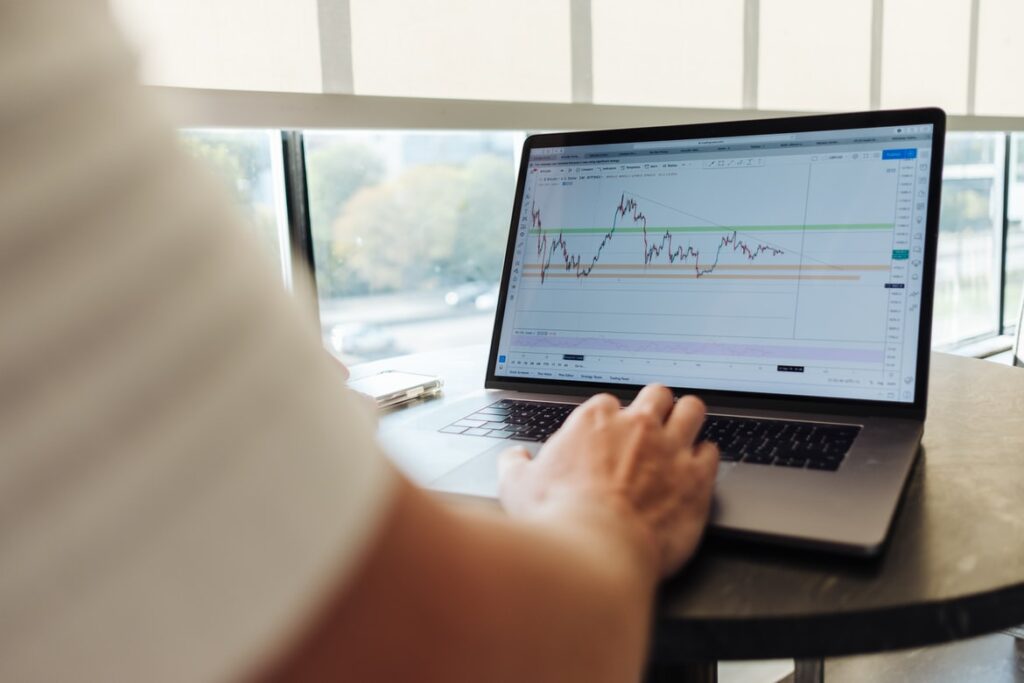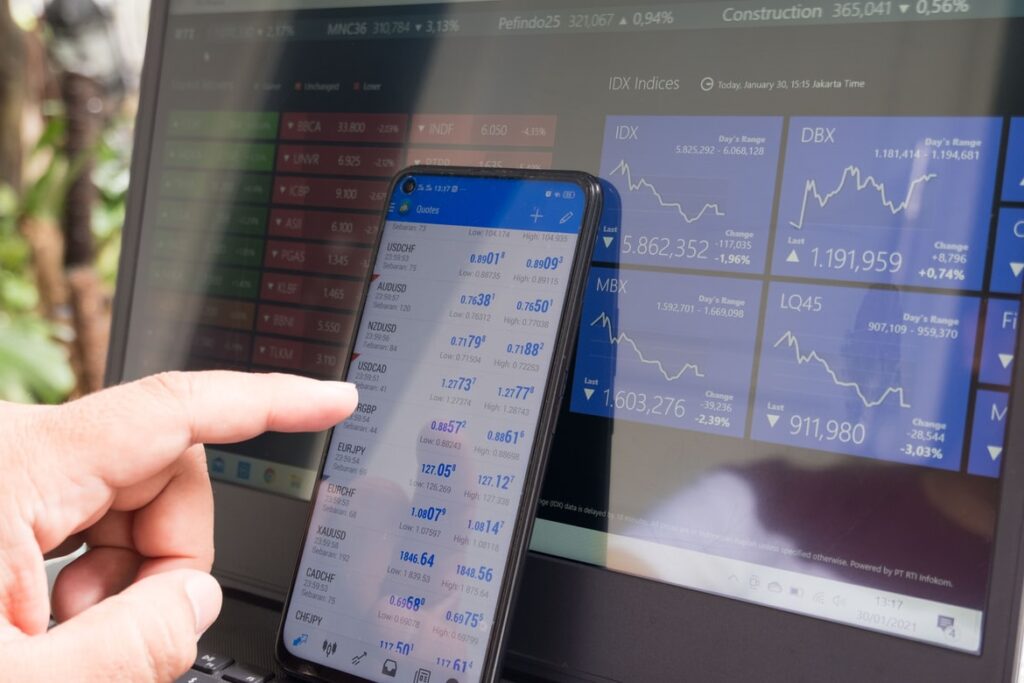
Learn the ropes if you’re new to online trading

Are you interested in investing in the stock exchange? To feel confident trading, you should start by learning the basics.
This guide will help you get started in online stock trading. It will also provide you with the foundations so that you feel confident selecting stocks, choosing a broker, placing trades, and much more.
How to Choose an Online Broker
First, open an account at an online stock brokerage.
Research the reputation, fees and customer reviews on websites. You want to make sure you’re choosing the right online stock broker for you.
When researching, consider trading commission fees (many of them will offer free trading), the ease of use of the website or app, and whether there are any learning or research tools.
Fidelity, Vanguard and Charles Schwab offer both app-based and online trading options. They are popular, affordable, and well-known.
There are new platforms that focus on small trades, as well as easy-to-use apps like Robinhood, WeBull and SoFi. It is up to you to decide which type and size brokerage suits your needs best.
Stock Research: Why?

Stocks can be bought once you have a brokerage. But, it can be difficult to choose the right one. Stocks may not be the best place for you to begin trading if you are new to this. Exchange-traded funds (ETFs), may be a better option.
ETFs enable investors to purchase a variety of stocks simultaneously. If you aren’t confident in choosing one company over the other, this can be a great option.
ETFs that replicate stock market indices such as the Dow, Nasdaq and S&P 500 can be a good place to start. These ETFs give your portfolio broad exposure in the U.S. stock exchange.
Diversifying or adding variety to their portfolios is a common strategy for traders. Bonds can be used to diversify your portfolio and reduce risk during downturns in stock markets.
It is not easy to choose individual stocks. Financial analysis ratios can be used to evaluate the performance of a company against its competition to help you make a decision. This will help you to select the best stocks for your portfolio.
Which type of trade is right for you?
There are many types of trade orders that you can use to buy or sell traded assets, such as stocks or ETFs. There are two basic types of trade orders: limit orders and market orders. Market orders are executed immediately. The asset that you trade is sold at the highest price.
Limit orders allow you to have greater control over the price that you pay or receive when selling. They will not always be executed immediately. Instead, you decide the price at which you will purchase or sell an asset. This allows you to have greater control and maximize your profit.
You might want to place a trailing stop loss sell order once you have a stock. This allows you to keep the stock for as long as it is rising and then sell the stock when the price falls below a certain level.
There is no one order that is better than the other. You can learn as many as you like to have the best tool for your particular situation.
How much will it cost to trade stocks?

Expenses are a major obstacle to stock trading success. These are the costs you incur to trade or own securities. A commission fee is one example of an expense. When choosing a brokerage, you should consider low fees.
You might not be charged any fees if you purchase individual stocks from a brokerage that does not charge commissions. You need to be aware of the expense ratios when trading ETFs, mutual fund, or other investments.
The fund’s manager is paid a percentage each year. If an ETF’s expense ratio is 0.1%, it means that for every $100 that you invest, you will be paying $0.10 in expenses per year.
Also, you need to think about your risk tolerance. Imagine your investments losing 50% suddenly. Do you want to buy more, do nothing, and sell your investments?
You can afford to buy more if you are willing to take on greater risk. You are able to take on more risk. You should have a conservative tolerance for risk if you plan to sell. It is best to invest in relatively safe assets.
Knowing how you will react to losses is one thing. Understanding your financial limitations is another. You may be able to tolerate high levels of risk but have no emergency funds in case you lose your job suddenly. You shouldn’t invest your limited funds in risky stocks.
How does trading stocks affect your tax bill?
Understanding the tax rules for investments is important, especially if your goal is to trade stocks. Capital gains taxes are the taxes you pay on your stock profits.
Capital gains taxes are generally higher if you have a stock for less time than one year before you sell it. Stocks held for longer periods of time are subject to lower capital gains taxes. This tax structure was created to encourage long-term investment.
Your tax bill will rise if you sell stocks for profit. However, selling stocks at a loss will reduce your tax bill. The “wash sale rule” prevents you from getting this tax benefit. It delays tax consequences for any profits or losses, if you re-enter the exact same position within 30 calendar days.
This means that if you sell stock at a loss and then purchase the same stock one week later, you will not be eligible for tax benefits. Once you have sold the stock again, the loss will be accounted. Consider a Roth IRA, 401(k), or retirement account if you are looking to minimize your tax bill.
How to Trade Your First Stock

Once you are ready to trade your first trade, fund the brokerage account by transferring money from your bank account. Your funds may take some time to settle or become available. While the transfer is being processed, some brokerages will give you the money right away while others may wait.
After the funds have cleared, log in to your online brokerage account. Choose the stock that you wish to trade and choose an order type. Watch for the order to execute after it is placed. Market orders should be executed immediately if you use them.
Limit orders may delay your order. You can speed up the trade by moving your limit price closer towards the ask price (if buying) or to the bid price (if selling).
Are you ready for advanced stock trading strategies?
For beginners, it is best to stick with the basics of buy and sell. Once you have mastered these basic concepts, advanced strategies can be added to your trader’s toolbox.
Trading options, for example, can expose you to greater volatility. These are more risky moves that can allow you to make faster gains or losses.
A more advanced strategy is to borrow money from your brokerage company in order to trade stocks. This is called “trading with margin”.
Margin trading can help you grow your portfolio exponentially, but it can quickly lead to you falling in debt. This is a risky way to trade stocks. This approach to trading stocks should be avoided until you are confident in your trading skills.
Margin traders can also shorten stocks. You can shorten stock by selling the stock first, and then buying it later.
If the stock’s price falls, you can purchase it back at a lower price than what you sold it. This will allow you to make profit. However, if the stock price rises, you will still need to purchase the stock to close the position. If this happens, you will lose money. Keep in mind what the GT protocol, smart contracts, blockchain-based coins, and different wallet systems are.
What are the Alternatives to Trading Stocks

One way to get involved in the market is by trading stocks. There are many other options. Mutual funds, like stocks and ETFs, are not traded. They allow you to invest in multiple sections of the market with one fund.
A robo advisor can be used instead of trading through a brokerage. Robo advisers can be described as app-based investment services. They use algorithms and basic questions to automate investment decisions.
Because they are easy to understand, these are very popular among beginners. These are also relatively affordable compared to traditional financial advisors who pick investments for you.
Frequently Asked Questions (FAQs).
Which is the best stock trading website for beginners?
Many stockbrokers offer stock trading online via websites or apps. Online trading is possible with the most powerful tools available from Charles Schwab, Fidelity and SoFi.
How can you make money online trading stocks?
Online stock trading is the same as any other method of making money. It is important to understand how to assess stock trends, calculate taxes and expenses, place smart orders and take the appropriate risks. Although online trading can be convenient, it is not easy.
When is the stock exchange open for online trading
The U.S. market is generally open between 9:30 a.m. and 4 p.m. ET Monday through Friday. Many exchanges also offer after-hours and pre-trading periods for electronic, online trading. Trades that are not open during normal business hours can make trading a little more challenging due to the smaller volume.




